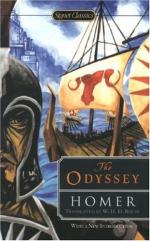“Do we know, Menelaus,” said she, “the names of these strangers who have come to visit us? Shall I guess right or wrong?—but I cannot help saying what I think. Never yet have I seen either man or woman so like somebody else (indeed when I look at him I hardly know what to think) as this young man is like Telemachus, whom Ulysses left as a baby behind him, when you Achaeans went to Troy with battle in your hearts, on account of my most shameless self.”
“My dear wife,” replied Menelaus, “I see the likeness just as you do. His hands and feet are just like Ulysses; so is his hair, with the shape of his head and the expression of his eyes. Moreover, when I was talking about Ulysses, and saying how much he had suffered on my account, tears fell from his eyes, and he hid his face in his mantle.”
Then Pisistratus said, “Menelaus, son of Atreus, you are right in thinking that this young man is Telemachus, but he is very modest, and is ashamed to come here and begin opening up discourse with one whose conversation is so divinely interesting as your own. My father, Nestor, sent me to escort him hither, for he wanted to know whether you could give him any counsel or suggestion. A son has always trouble at home when his father has gone away leaving him without supporters; and this is how Telemachus is now placed, for his father is absent, and there is no one among his own people to stand by him.”
“Bless my heart,” replied Menelaus, “then I am receiving a visit from the son of a very dear friend, who suffered much hardship for my sake. I had always hoped to entertain him with most marked distinction when heaven had granted us a safe return from beyond the seas. I should have founded a city for him in Argos, and built him a house. I should have made him leave Ithaca with his goods, his son, and all his people, and should have sacked for them some one of the neighbouring cities that are subject to me. We should thus have seen one another continually, and nothing but death could have interrupted so close and happy an intercourse. I suppose, however, that heaven grudged us such great good fortune, for it has prevented the poor fellow from ever getting home at all.”
Thus did he speak, and his words set them all a weeping. Helen wept, Telemachus wept, and so did Menelaus, nor could Pisistratus keep his eyes from filling, when he remembered his dear brother Antilochus whom the son of bright Dawn had killed. Thereon he said to Menelaus,
“Sir, my father Nestor, when we used to talk about you at home, told me you were a person of rare and excellent understanding. If, then, it be possible, do as I would urge you. I am not fond of crying while I am getting my supper. Morning will come in due course, and in the forenoon I care not how much I cry for those that are dead and gone. This is all we can do for the poor things. We can only shave our heads for them and wring the tears from our cheeks. I had a brother who died at Troy; he was by no means the worst man there; you are sure to have known him—his name was Antilochus; I never set eyes upon him myself, but they say that he was singularly fleet of foot and in fight valiant.”




